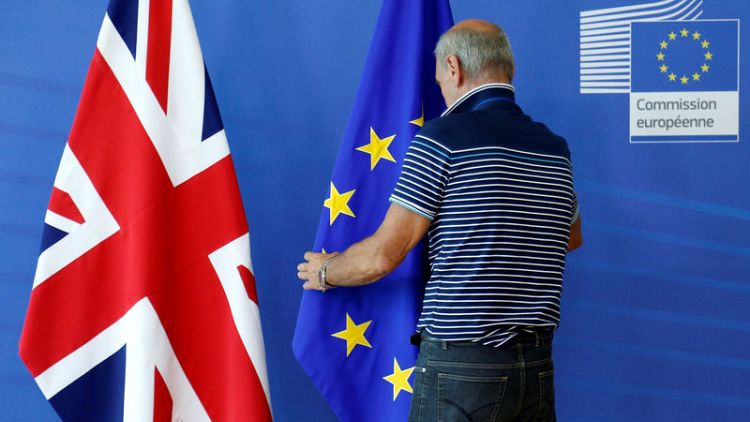By Francesco Guarascio
BRUSSELS (Reuters) - Britain may be required to channel more money than expected into the European Union budget after it leaves the bloc because EU liabilities are going up driven by higher pension costs and financial guarantees, EU data released on Thursday show.
Under a draft agreement reached in March with EU partners, Britain committed itself to honour liabilities and debt assumed by the EU until the end of 2020.
The British government has estimated the total Brexit bill to be 39 billion pounds after the draft financial deal was agreed with Brussels.
But now new data show EU debts are growing, a trend that could translate into a larger tab for Britain.
The European Court of Auditors (ECA) said in a report released on Thursday that EU's pension liabilities have grown to 73.1 billion euros ($84.29 billion) in 2017 from a previous estimate of 67.2 billions.
EU states contribute to the common budget in proportion to their economic output.
The president of the court, Klaus-Heiner Lehne, said it was impossible at this stage to calculate how much the final bill for Britain will be, because terms of its agreement with the EU and financial figures could change as divorce talks enter their crucial phase before Brexit in March next year.
ECA officials acknowledged the British bill for EU staff pensions liabilities could increase but said the final figure would depend on how Britian agrees to pay its share of these liabilities.
The Brexit bill could also be inflated by so-called "contingent liabilities", which are EU guarantees on investment projects or on European Investment Bank's loans.
They have increased to 123 billion euros in 2017 from 115.3 the previous year, the ECA report showed.
Britain has accepted to pay all EU liabilities covering financial operations agreed before its departure from the EU.
Auditors pointed out that these liabilities may never trigger payments if loans are recouped and funded projects are successful. They could also generate profits in the best scenario.
In addition to these possible extra financial and pension payments, which Britain will have to sustain for many years after Brexit, EU states are required to pay the money they have committed to the EU budget by 2020.
Britain has committed to pay 6.3 billion euros into the EU 2014-2020 budget but has so far disbursed only 1 billion euros.
Auditors warned that delays in spending and approval of EU projects had pushed up outstanding commitments to the record level of 267.3 billion euros last year.
This unspent money committed by EU states could be called in before 2020, forcing governments to make large payments in a short period, auditors said, cautioning that not all money might be available when needed because of this backlog.
Under EU rules, money could be paid up to three years after 2020, once spending projects are approved. Projects funded in Britain could also benefit from these funds.
(Reporting by Francesco Guarascio; Editing by Richard Balmforth)



